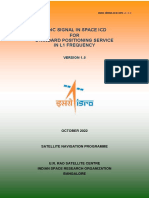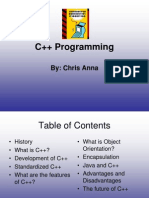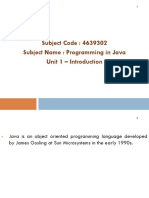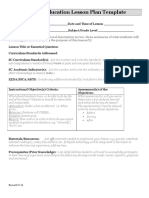0 ratings0% found this document useful (0 votes)
55 viewsJava Vs C
This document compares Java and C++ across several categories:
1. General programming issues - Java does not use a preprocessor or support variable-length parameters lists while C++ does. Java also does not support goto statements or global variables.
2. Object-oriented programming - Java is a pure object-oriented language while C++ is a hybrid. In Java, all methods belong to a class while C++ allows standalone functions.
3. Special characteristics - Java is designed for network and web applications and supports automatic garbage collection and multithreading. C++ is architecture specific and does not support these features.
Uploaded by
syntheticsensationCopyright
© Attribution Non-Commercial (BY-NC)
Available Formats
Download as DOC, PDF, TXT or read online on Scribd
0 ratings0% found this document useful (0 votes)
55 viewsJava Vs C
This document compares Java and C++ across several categories:
1. General programming issues - Java does not use a preprocessor or support variable-length parameters lists while C++ does. Java also does not support goto statements or global variables.
2. Object-oriented programming - Java is a pure object-oriented language while C++ is a hybrid. In Java, all methods belong to a class while C++ allows standalone functions.
3. Special characteristics - Java is designed for network and web applications and supports automatic garbage collection and multithreading. C++ is architecture specific and does not support these features.
Uploaded by
syntheticsensationCopyright
© Attribution Non-Commercial (BY-NC)
Available Formats
Download as DOC, PDF, TXT or read online on Scribd
You are on page 1/ 3
Q#02:
Java versus C++: (a) General programming issues
Java C++
Method bodies must be defined inside the Method bodies must be defined inside the
class to class to
which they belong. which they belong.
No forward referencing required. Explicit forward referencing required.
No preprocessor. Heavy reliance on preprocessor.
No comma operator. Comma operator.
No variable-length parameter lists. Variable-length parameter lists.
No optional method parameters. Optional function parameters.
No const reference parameters. const reference parameters.
No goto goto
Labels on break and continue. No labels on break and continue.
Command-line arguments do not include the Command-line arguments do not include the
program name. program name.
Main method cannot return a value. Main function can return a value.
No global variables. Global variables.
Character escape sequences must appear in a
Character escape sequences can appear in a
string
program.
or character literal.
Cannot mask identifiers through scope. Can mask identifiers through scope.
Java versus C++: (b) Object-oriented programming
Java C++
Hybrid between procedural and object-
Pure object-oriented language.
oriented.
All functions (methods) are part of a class. Can have stand-along functions.
No multiple inheritance. Multiple inheritance.
Formal interface specifications. No formal interface specifications.
No parameterized type. Templates as parameterized type.
No operator overloading. Operator overloading.
All methods (except final methods) are
dynamically Virtual functions are dynamically bound.
bound.
Java versus C++: (c) Special characteristics
Java C++
Specifically attuned to network and Web
No relationship to networks or the Web.
processing.
Automatic garbage collection. No automatic garbage collection.
Combination of compiled and interpreted. Compiled.
Slower execution when interpreted. Fast execution.
Architecture neutral. Architecture specific.
Supports multithreading. No multithreading.
Automatic generation of documentation in HTML No automatic documentation
format. generation.
Java versus C++: (d) Primitive types
Java C++
Two type categories. Various type categories.
Separate types for structs, unions, enums, and
All nonprimitive types are objects.
arrays.
All numeric types are signed. Signed and unsigned numeric types.
All primitive types are a fixed size for all
Primitive type size varies by platform.
platforms.
16-bit Unicode characters. 8-bit ASCII characters.
Boolean data type primitive. No explicit boolean data type.
Integer results are interpreted as boolean
Conditions must be boolean expressions.
conditions.
Variables are automatically initialized. No automatic initialization of variables.
Java versus C++: (e) Pointers and data structures
Java C++
References, with no explicit pointer Pointers, with dereferencing (* or ->) and
manipulation address (&)
and no pointer arithmetic. operators.
Array references are not translated to pointer Array references translate to pointer
arithmetic. arithmetic.
Arrays automatically check index limits. No automatically array bounds checking.
Array lengths in multidimensional arrays can Array lengths in multidimensional arrays are
vary all the
from one element to the next within one same size in a give dimension, fixed by the
dimension. declaration.
Strings are objects. Strings are null-terminated character arrays.
String concatenation through a library
Built-in string concatenation operator(+).
function.
Use string concatenation operator for long Use line continuation (\) for long string
string literals. literals.
No typedef. typedef to define types.
----------------Best of Luck------------------------------
You might also like
- Comprehensive Interview Material - Onlinestudy4u100% (2)Comprehensive Interview Material - Onlinestudy4u61 pages
- 300 Core Java Interview Questions - Javatpoint100% (2)300 Core Java Interview Questions - Javatpoint43 pages
- OpenText Media Management 16.3 - Installation Guide English (MEDMGT160300-IGD-En-01)No ratings yetOpenText Media Management 16.3 - Installation Guide English (MEDMGT160300-IGD-En-01)262 pages
- Primitive Types: Boolean Char Byte Short Int Long Float DoubleNo ratings yetPrimitive Types: Boolean Char Byte Short Int Long Float Double6 pages
- Differences Between Java and C/C++: The PreprocessorNo ratings yetDifferences Between Java and C/C++: The Preprocessor4 pages
- JAVA V.S. C++: Programming Language ComparisonNo ratings yetJAVA V.S. C++: Programming Language Comparison15 pages
- Object-Oriented Programming Languages: Java vs. C++ Programming Language ComparisonNo ratings yetObject-Oriented Programming Languages: Java vs. C++ Programming Language Comparison8 pages
- 1) Explain Object Oriented Programming Concept ObjectsNo ratings yet1) Explain Object Oriented Programming Concept Objects10 pages
- C++ vs. Java: Similiarities & Differences: Dr. Jeyakesavan VeerasamyNo ratings yetC++ vs. Java: Similiarities & Differences: Dr. Jeyakesavan Veerasamy15 pages
- 377 Student Guide To C++: C Mark Corner, Edited by Emery Berger January 23, 2006No ratings yet377 Student Guide To C++: C Mark Corner, Edited by Emery Berger January 23, 200616 pages
- 1.4 How To Differentiate Between C++ and JavaNo ratings yet1.4 How To Differentiate Between C++ and Java2 pages
- 1.300 Core Java Interview Questions (Basic - X1time)No ratings yet1.300 Core Java Interview Questions (Basic - X1time)181 pages
- 300 Core Java Interview Questions (2022) - javatpointNo ratings yet300 Core Java Interview Questions (2022) - javatpoint33 pages
- 300 Core Java Interview Questions (2023) - JavatpointNo ratings yet300 Core Java Interview Questions (2023) - Javatpoint52 pages
- 300 Core Java Interview Questions (2023) - JavatpointNo ratings yet300 Core Java Interview Questions (2023) - Javatpoint50 pages
- 300 Core Java Interview Questions Part - 1No ratings yet300 Core Java Interview Questions Part - 160 pages
- Que. Difference Between C++ and Java. AnsNo ratings yetQue. Difference Between C++ and Java. Ans19 pages
- Transition From C++ To Java: Walt Savitch University of California, San Diego Wsavitch@ucsd - EduNo ratings yetTransition From C++ To Java: Walt Savitch University of California, San Diego Wsavitch@ucsd - Edu47 pages
- Transition From C++ To Java: Walt Savitch University of California, San Diego Wsavitch@ucsd - Edu0% (1)Transition From C++ To Java: Walt Savitch University of California, San Diego Wsavitch@ucsd - Edu47 pages
- Object Oriented Programming and C++: C++ Compared To JavaNo ratings yetObject Oriented Programming and C++: C++ Compared To Java28 pages
- Differences Between C++ and Java: University of Information Technology and Management in Rzeszów, PolandNo ratings yetDifferences Between C++ and Java: University of Information Technology and Management in Rzeszów, Poland7 pages
- Subject Code: 4639302 Subject Name: Programming in Java Unit 1 - IntroductionNo ratings yetSubject Code: 4639302 Subject Name: Programming in Java Unit 1 - Introduction17 pages
- Core Java - Basics of Java Interview QuestionsNo ratings yetCore Java - Basics of Java Interview Questions50 pages
- C++ Functional Programming for Starters: A Practical Guide with ExamplesFrom EverandC++ Functional Programming for Starters: A Practical Guide with ExamplesNo ratings yet
- Immediate download The Pivot of the Universe Nasir al Din Shah and the Iranian Monarchy 1831 1896 I B Tauris 2008 Abbas Amanat ebooks 2024No ratings yetImmediate download The Pivot of the Universe Nasir al Din Shah and the Iranian Monarchy 1831 1896 I B Tauris 2008 Abbas Amanat ebooks 202487 pages
- Assignment-2: Mobile and Digital ForensicsNo ratings yetAssignment-2: Mobile and Digital Forensics4 pages
- RDZ Web Services Tutorial 03 Cics Web Services Enablement (Bottom-Up)No ratings yetRDZ Web Services Tutorial 03 Cics Web Services Enablement (Bottom-Up)77 pages
- Speros Vryonis - The Byzantine Legacy and Ottoman FormsNo ratings yetSperos Vryonis - The Byzantine Legacy and Ottoman Forms59 pages
- Guru Stotram - Gurur Brahma Gurur Vishnu - Sanskrit With Meaning - Stotra On Sri GurudevaNo ratings yetGuru Stotram - Gurur Brahma Gurur Vishnu - Sanskrit With Meaning - Stotra On Sri Gurudeva9 pages
- Two-Member QFX Series Virtual Chassis Upgrade Procedure: Network Configuration ExampleNo ratings yetTwo-Member QFX Series Virtual Chassis Upgrade Procedure: Network Configuration Example23 pages
- A Service Creation Environment Based On End To End Composition of Web ServicesNo ratings yetA Service Creation Environment Based On End To End Composition of Web Services10 pages
- Pages From Cambridge IELTS 18 GT 2023 Reading Test 4No ratings yetPages From Cambridge IELTS 18 GT 2023 Reading Test 414 pages
- The Entheogen Review׃ Vol. 16, No. 2 (2008)No ratings yetThe Entheogen Review׃ Vol. 16, No. 2 (2008)84 pages
- Read All These Recommendations Carefully To Make The Best of Your SceneNo ratings yetRead All These Recommendations Carefully To Make The Best of Your Scene10 pages
- Implementing Field Exit For The Transaction MK01: ABAP - Interview ExitsNo ratings yetImplementing Field Exit For The Transaction MK01: ABAP - Interview Exits18 pages
- Java Programming: Open Ended Experiment To Make Basic CalculatorNo ratings yetJava Programming: Open Ended Experiment To Make Basic Calculator6 pages

























































































